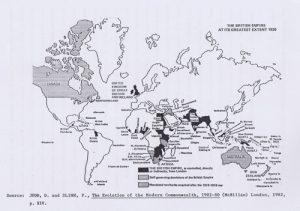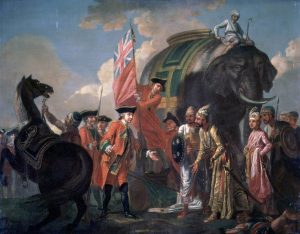American Anti-Colonialism, and the Liquidation of the British Empire.
However, as a result of the tragic massacre at Amritsar in 1919 and the Rowlatt Acts with their repressive provisions against sedition, Indian nationalists found it hard to treat the new measures with open mindedness. On the other hand, once again the Dominions attempted to assert their national needs. In the Imperial War Conference of 1917 the Dominion leaders pressed for an Imperial Conference after the war so that the constitutional relations of the self-governing empire could be adjusted; in other words, to explain the Dominion status in realistic terms. The Dominions’ later demand was to be admitted as independent nations to the Peace Conferences and to be allowed to sign the peace treaties in their own right. Thus, the Dominions were represented as separate nations at the Peace Conferences and of course at the same time being part of the British Empire delegations. Also, India was able to sign the treaties in her own right. So, by 1919, “the Dominions had been seen to ‘come of age’ – both in a practical and in a diplomatic sense – something which Lloyd George’s decision to treat them (and India) as equal at the 1917 Imperial Conference had ensured.”37 Additionally, the acquisition of mandated territories in the case of Australia, New Zealand and South Africa and the membership of the League of Nations in the case of the Dominions was further proof of Lloyd George’s decision at the Imperial Conference in 1917.
As time progressed it became evident that the imperial system could not long continue to resist the pressure of nationalism in various empire zones. As India still lacked self-governing status and nationalism continued in Ireland it looked clear that not only the British Prime Minister, David Lloyd George’s, efforts to sustain the spirit of co-operation and the practice of centralisation were not successful but the unity of the British Empire was already set upon a course of steady decline.
The impact of the Second World War also a further push in the British Empire’s process of disintegration. Unlike the First World War, Britain’s plunge into the Second World War did not itself commit the whole of the Colonial Empire and the Dominions. Although, in 1939, the Colonial Empire and the Dominions together were larger in terms of territory and population than in 1914 they were also much more fragile and disaffected. “With the exception of India, whose central government was still controlled by London, the other members of the empire had each to make the supreme decision. Eire unhesitatingly took its stand as a neutral, Canada and South Africa waited a few days until their parliaments voted for war, while Australia and New Zealand declared that they were at war simultaneously with the mother county.”38
During the Second World War, however, the contribution of the empire was training and food supplies. From September 1939 until mid 1940 when France fell and Italy entered the War “Canada and Southern Rhodesia became the hosts to air crew training schemes far from the battlefield.



